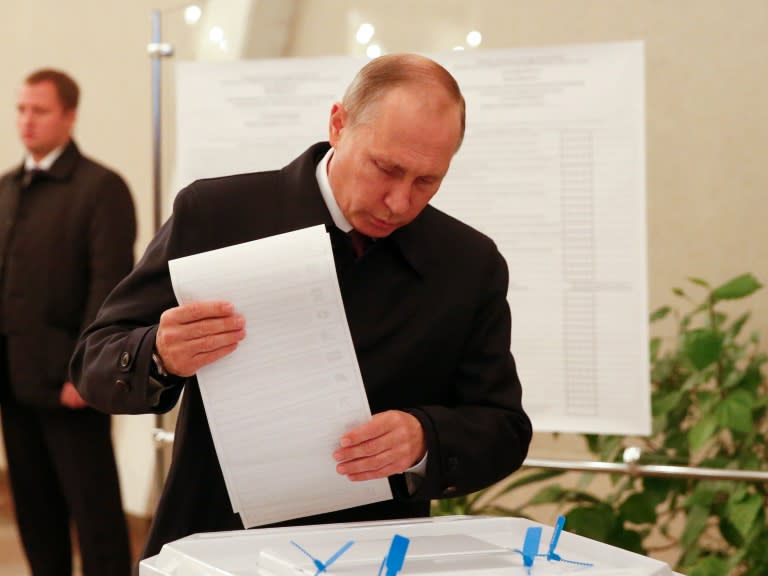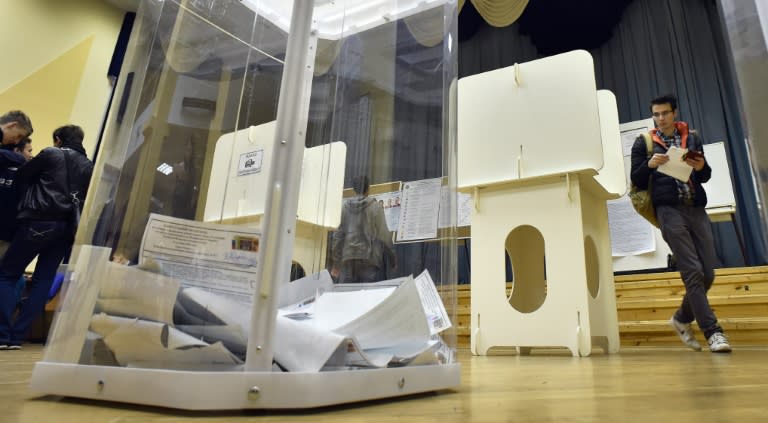Putin's party dominates at Russia parliament vote
President Vladimir Putin's ruling United Russia party on Sunday cruised to an easy victory at parliamentary elections, exit polls showed, despite the longest economic crisis of his 16-year rule. The ballot for the 450-seat State Duma appeared to have been smooth sailing for authorities desperate to avoid a repeat of mass protests last time round and could now pave the way for Putin to glide to a fourth term as president at elections set for 2018. But indications of a low turnout appeared to show that many Russians may be turned off by a system in which the Kremlin wields near-total power and could raise questions over legitimacy. "We can announce already with certainty that the party secured a good result, that it won," Putin said after the vote. "The situation is tough and difficult but the people still voted for United Russia." State pollster VTsIOM put the ruling United Russia on 44.5 percent of the vote, ahead of the ultra-nationalist Liberal Democratic Party on 15.3 percent, the Communists on 14.9 and A Just Russia on 8.1. - 'Absolute majority' - Those four parties -- which made up the last parliament and all back the Kremlin -- were the only ones to clear the five percent threshold needed to claim a share of the one-half of seats up for grabs. The other half of the deputies are being elected on a constituency basis after a change to the election law. So far United Russia has won 66 out the 76 single candidate seats that have been counted, the electoral commission said. The overall tally for United Russia could be down slightly on the 49 percent they claimed in 2011 but Prime Minister Dmitry Medvedev said that party would still end up with an "absolute majority" in the Duma. There was no final turnout figure but just a few hours ahead of the polls closing less than 40 percent of voters had cast their ballots. "It is not the biggest we have seen compared to previous election campaigns but it is high," Putin said. Sunday's election follows a tumultuous few years that have seen Russia seize the Crimea peninsula from Ukraine, plunge into its worst standoff with the West since the Cold War and start a military campaign in Syria. But the Kremlin exerts almost complete control over the media and public discourse, and this year's election campaign was dubbed the dullest in recent memory. - Violations? - Looming large was the spectre of mass protests over vote rigging that followed the last legislative polls five years ago and grew into the biggest challenge to Putin since he took charge in 2000. Since then the Kremlin has cracked down on the right to protest while making a show of stamping out electoral manipulation. The former scandal-tainted election chief was removed in favour of a human rights advocate who allowed more genuine opposition candidates to take part. Despite the authorities pledging to crack down on vote-rigging, observers around the country made claims of violations including "cruise-voting" -- where people are bussed to vote at multiple polling stations -- and ballot stuffing. Electoral Commission chief Ella Pamfilova admitted that there had been problems in certain regions but officials said the number of violations was way down on last time. For the first time since Moscow seized the Black Sea peninsula of Crimea in 2014, residents there voted for Russia's parliament, in a poll slammed by Ukraine as illegal. Voters in some areas of the vast country were also electing regional leaders. In the North Caucasus region of Chechnya, strongman Ramzan Kadyrov looked set to win a crushing victory in the first electoral test of his rule after rights groups said that criticism was ruthlessly silenced during the campaign.



